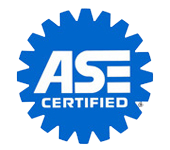
Radiator Heating Services & Repair
A Comprehensive Assessment of Your Heating and Cooling System Comprises of:
- Examination of internal controls and blower
- Inspection of radiator coolant temperature, hoses, radiator cap pressure, and thermostat
- Evaluation of the compressor belt
- Thorough inspection of the system and seals for leaks or damage
- Conducting a cooling system pressure test
- Verification that A/C pressure meets manufacturer specifications
- Measurement of the interior vent air temperature
Our Repair and Maintenance Services Include:
Belts
The fan belt, also referred to as a drive belt, connects your vehicle's engine to its front-mounted accessories. This belt is responsible for rotating the water pump and engine fan, ensuring a cool engine environment. Unfortunately, over time, your vehicle's fan belts can dry out and develop cracks, requiring a replacement.
Coolant System Flush
A car's coolant system transfers excess heat from one part of the engine and dissipates it through the radiator fins. As time goes on, the coolant can become old and contaminated, negatively impacting the system's performance. To maintain optimal system function, consider regular coolant system flushes as part of your vehicle's cooling system maintenance.
Hoses
Hoses have the crucial role of transferring coolant and antifreeze throughout the engine's cooling system, including the radiator. With time, these hoses can dry out and develop cracks, leading to leaks. When it's time for replacement, you can rely on our team of experts for your vehicle repair needs.
Radiator Flush
Your vehicle's radiator is responsible for keeping the engine cool and safeguarding it from excessive heat. Sludge, rust, and other solid deposits can accumulate inside the radiator, leading to clogs and reduced system efficiency. This, in turn, can negatively affect your vehicle's performance. Incorporating regular radiator flushes into your routine car maintenance schedule is essential.
Radiators
Radiators serve as heat exchangers, cooling your car's internal combustion engine. They accomplish this by circulating engine coolant through the engine block and then releasing the heat into the atmosphere through radiation.
Summerize Your Vehicle
Getting your car ready for the challenges of summer, including heat, dust, and traffic congestion, can significantly reduce the risk of breakdowns. At Ray Scott's Automotive in Tucson, our technicians are equipped to perform essential preventive maintenance to ensure your car is summer-ready. Here are some recommended services:
- Battery check
- Fluid replacement
- Examination of belts and hoses
- Inspection of climate and coolant systems
- Evaluation of wiper blades
- Tire inspection
- Assessment of headlights, turn signals, and tail lights
Winterize Your Vehicle
Winter weather can be harsh on both you and your vehicle. You can trust the skilled technicians at Ray Scott's Automotive to prepare your car for the challenges of winter. Here are some recommended services:
- Check the battery
- Check the tires
- Check wiper blades
- Check fluids
- Check headlights, turn signals, and tail lights
- Check the exhaust system for leaks
- Check the belts and hoses
- Check the heating system
With these services, your car will be ready to tackle winter weather, ensuring your driving experience remains safe and comfortable.
Coolant FAQs
When should I do a coolant flush?
Your vehicle's owner's manual will recommend getting the coolant flushed about every 30,000 miles or three to five years, whichever comes first. Make sure to consult your owner's manual as some outline a more specific interval depending on the vehicle's make and model and your driving habits.
Why is my coolant leaking?
Corrosion within the radiator is the leading cause of a coolant leak. As the radiator tubes get older and weaker, sediment or debris collects inside and causes a leak. The sealing gasket between the tank and the radiator can also wear out, and lead to a leak.
Why is my coolant light on and what should I do?
If the dashboard light is red, indicating your car is overheating then you should pull over as soon as it is safe to do so and switch off the engine. If the coolant level is low or there is another problem with your cooling system, you could cause serious damage by continuing to drive.
Radiator FAQs
What does radiator service include?
Radiator service starts with draining the system. Then we flush the radiator and engine block, inspecting all hoses to make sure they're not cracked. Next we refill the radiator with fresh coolant and finish by pressure testing the radiator cap and cooling system.
What is the average lifespan of a radiator?
While radiators usually last 8-10 years, some factors can shorten their lifespan. Watch for signs of deterioration to know when replacement is needed.
Why is my car engine overheating?
The most common reason a car overheats is a lack of coolant or a coolant leak. However, if you have an older vehicle, it may also indicate that it is time to replace your radiator, thermostat, water pump or heater core. If it continues to be a problem that you can't fix, your best bet is to bring it to our shop in Tucson.
To learn more about our Heating and Cooling services, call us at 520-623-9374 or request a quote by clicking below:
Request Quote
Discover More About Engine Heating & Cooling Repair Services At Ray Scott's Automotive in Tucson
Customer Service
Contact Us

Contact Us Today!
Got questions? We've got answers! Drop us a line, give us a call, or even stop by. Our team is eager to help you with any auto repair needs you have. Let's get you back on the road safely and swiftly!
What Our Customers Are Saying
Best auto shop in Arizona! Great folks.
Plenty of patience with the explanation of one's automotive repair need.
These guys are great mechanics, prices are fair, and service is pretty darn quick too. You will love Ray Scott's.
Worked for Dan and Danny, they were very honest people and honest to their customers. After leaving Ray Scott's as my place of employment, I returned to have my own vehicles worked on.









